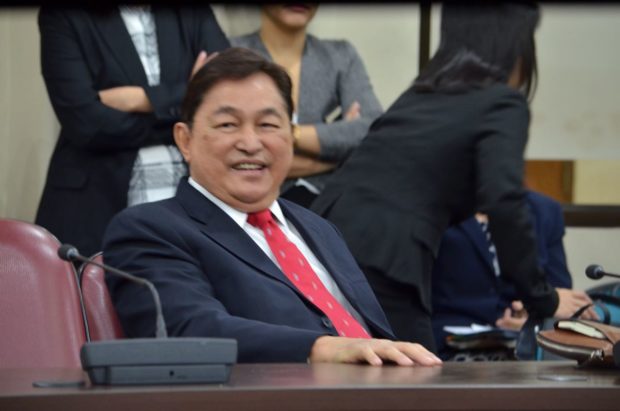Must Congress vote jointly or separately on Cha-cha? Ex-SC justice weighs in

(FILE PHOTO) Former Supreme Court Justice Adolfo Azcuna. INQUIRER.net / Noy Morcoso
MANILA, Philippines — Even as the House committee on constitutional amendments already approved a resolution pushing to amend the “restrictive” economic provisions in the 1987 Constitution, the Charter change (Cha-cha) process seems to remain unclear.
One of the questions that still hound the Cha-cha process is whether or not the Senate and House should vote jointly or separately on the controversial topic.
During Tuesday’s hearing of the House committee on constitutional amendments, former Supreme Court Justice Adolfo Azcuna was asked about his interpretation of the Cha-cha process, as stated in the Constitution.
Under the Constitution, one of the three ways to propose amendments or revisions to the country’s principal code is via constituent assembly (Con-Ass).
Through a vote of three-fourths of all of its members, Congress can convene into a Con-Ass and propose amendments or revisions to the 1987 Constitution. This body will be made up of all congressmen and senators.
Article continues after this advertisementHowever, the Constitution does not specify whether the two chambers of Congress will vote jointly or separately during the Cha-cha process.
Article continues after this advertisementThis matters because if the House and Senate vote jointly on Cha-cha, a majority of the lower chamber’s members can easily make the decisions since there are only 24 senators compared to the 301 congressmen.
“Anong ibig sabihin ng three-fourths of all its members? I believe that it is three-fourths of the Senate and three-fourths of the House, voting separately,” Azcuna said.
“Why? Because of the bicameral nature and structure of our legislative body, they have to act separately when it comes to voting,” he added.
Azcuna explained that under Article VI of the 1987 Constitution, the legislative department is composed of the Senate and the House and that these two chambers make up the Congress.
“So when Article 17 speaks of three-fourths vote of all the members of Congress, it means three-fourths vote of the Senate and of the House,” Azcuna said.
Further, Azcuna expressed his personal belief that when Congress acts as a constituent body to consider proposed amendments or revisions to the Constitution, the Senate and the House should sit jointly.
However, Azcuna acknowledged that this is only the “preferred view” and is not required by the Constitution.
“So long as it is Congress deliberating, they can do it separately, as long as voting is not joint. I think the Constitution is very clear that it should be three-fourths of all the members, and members mean Senate and House,” Azcuna said.
“If I should be wrong and voting is by individuals… I still submit that in that eventuality, joint voting should include at least a majority of the Senate. Perhaps an absolute majority will be required, that is 13,” Azcuna added.
He added: “Why? Because if you do not have a majority of the Senate, then the action is not an act of the Senate. If it is not an act of the Senate, it is not an act of Congress because Congress is Senate and House.”
Azcuna was also asked if he believes the House committee on constitutional amendments is already sitting as a Con-Ass even if there are no senators present in the discussions.
To recall, during a House Cha-cha hearing on January 13, Ako Bicol party-list Rep. Alfredo Garbin Jr. explained since the committee is dealing with proposals to revise the charter, it is already sitting as a Con-Ass “exercising our constituent power.”
Garbin said the House committee was already convening as a Con-Ass even as other lawmakers pointed out that a Con-Ass must be a joint meeting of members of the House and members of the Senate.
“The committee, in my mind, taking preparatory steps already for Congress to act as a constituent assembly, but until a resolution is adopted and passed by the necessary votes, then I believe that the act of converting yourself into a constituent assembly is not completed,” Azcuna said.
At the end of Tuesday’s hearing, the House committee on constitutional amendments adopted Resolution of Both Houses No. 2 filed by Speaker Lord Allan Velasco wherein the phrase “unless otherwise provided by law” would be added to the constitutional restrictions that limit the participation of foreign investors in the governing body of entities based on their proportionate share in the capital.
The same phrase would likewise be added to provisions saying only Filipino citizens can control, own, and/or lease public utilities, educational institutions, mass media companies, and advertising companies in the country.